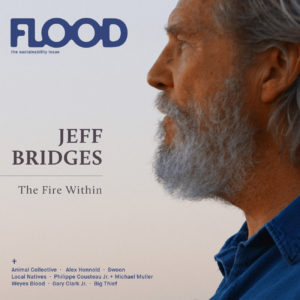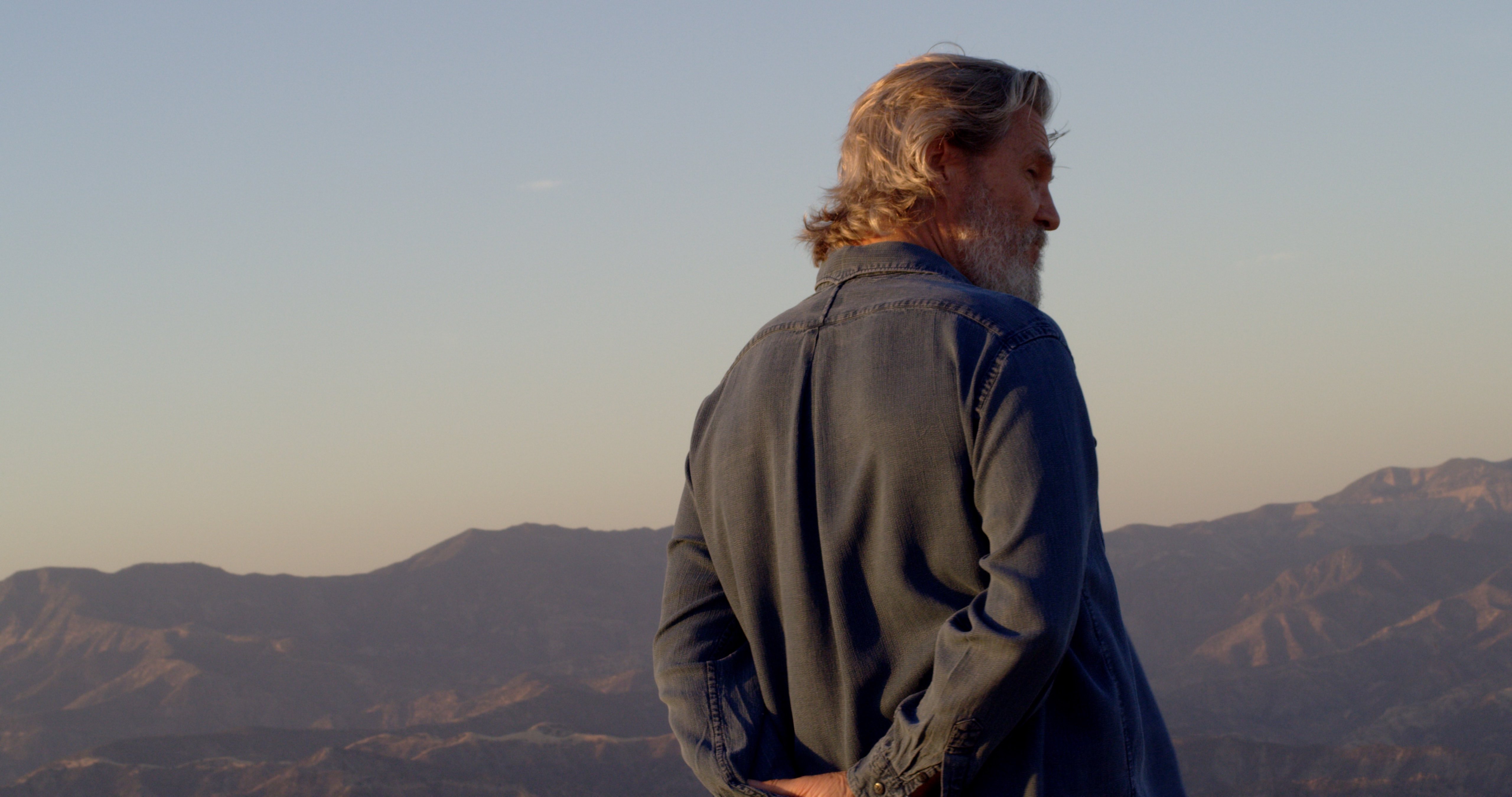This article appears in FLOOD 10. You can purchase the magazine here.
In the opening scene of Living in the Future’s Past, Jeff Bridges stands on a grassy California ridgetop. As the ocean breeze blows his big mane of salt-and-pepper hair, he seems to be contemplating the best of the natural world—but then he asks, “Have we reached the limits of our human nature? Is this the end of the line for us?”
He is right to wonder. His home in the coastal town of Montecito sits somewhere below that same ridge, a beautiful house in a beautiful place—but climate change is coming for everyone. It’s not in the documentary, but just a few weeks after this footage was shot, the Thomas Fire burned over that spot in what was then the largest wildfire in California history. And when the rains came shortly thereafter in January of 2018, Bridges and his wife Susan Geston were in their home when mudflows swept boulders the size of refrigerators right through the house. In a desperate rescue, they had to be plucked from the front yard by ropes suspended from a helicopter. The house was destroyed.
All over the world, climate disasters are forcing us to talk about sustainability. But this movie proposes a more essential question: What, exactly, are we trying to sustain? Is there something in our evolutionary selves that needs to change?
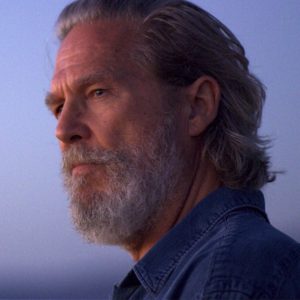 We’re all a little bit like The Dude, Bridges’ iconic character from the Coen brothers’ 1998 film The Big Lebowski: we abide. As a strategy for living, we accept the rapid pace of change because we recognize we can’t affect it much. When the bad guy is putting The Dude’s head in the toilet and screaming “Where’s the money?!,” Bridges’ character gasps, “It’s down there somewhere, let me take another look.” The Dude is radicalized by this basically Buddhist approach to living; his sense of slobby stasis is a heroic pose. He’s resilient. He thinks of himself in the gallant third person: “The Dude abides.”
We’re all a little bit like The Dude, Bridges’ iconic character from the Coen brothers’ 1998 film The Big Lebowski: we abide. As a strategy for living, we accept the rapid pace of change because we recognize we can’t affect it much. When the bad guy is putting The Dude’s head in the toilet and screaming “Where’s the money?!,” Bridges’ character gasps, “It’s down there somewhere, let me take another look.” The Dude is radicalized by this basically Buddhist approach to living; his sense of slobby stasis is a heroic pose. He’s resilient. He thinks of himself in the gallant third person: “The Dude abides.”
So when we imagine a “sustainable” future, in our Dudeness, it’s likely that even the activists among us are dooming the world to staying mostly like it is right now. And that makes perfect sense: faced with climate catastrophe that promises extreme heat, sea rise, farm-killing drought, vicious storms, species loss, and mass migrations of hundreds of millions of people and the wars and reactionary policies that mess could inspire, today looks like paradise. But you only have to glance at today’s news to know that right now, we are already in crisis.
“I didn’t want to make another film pointing fingers at the bad guys and scaring people with the dire straits—I thought there was enough of that out there already.”
The reason that Bridges and director Susan Kucera made Living in the Future’s Past is that today is already broken, and we’re not looking at the real reasons why. Their movie argues that climate change is happening not just because some of us live wrongly, or because of greedy oil companies, but because of who we are as Homo sapiens: hungry, technological, energy-devouring, and largely indistinguishable from one another in our needs. Changing that means changing the entire species. We’re all getting roughed up while we try not to spill our White Russians, protesting, “Careful, man, there’s a beverage here!” We want to keep our lives pretty much the same. I don’t think the human species has really dealt with climate adaptation at all.
—
The first person I’ve ever FaceTimed in my life is Jeff Bridges. He finds that amusing, and gives me a tip to tilt my glasses down so he can see my eyes. He laughs easily and is as affable as you’d imagine. “You ever see 2001: A Space Odyssey?” Bridges says about FaceTime. “It reminds me of when he’s talking to his daughter from outer space, except the resolution is better.”
Future’s Past is not another well-meaning film telling us we’re screwed. We know that already. Powerful documentaries from An Inconvenient Truth to Gasland to Chasing Ice have been telling us for decades that global warming is real and that humans are accelerating it enormously, and some of these films have suggested fixes: stop burning fossil fuels, eat vegetarian, plant trees. But this film doesn’t do that. Instead, it has a more ambitious intention: it’s looking for an answer inside of our DNA.
“I didn’t want to make another film pointing fingers at the bad guys and scaring people with the dire straits—I thought there was enough of that out there already,” says Bridges. “I got together with Susan, and both of us asked: Why are we behaving this way? When all of our scientists and all the experts are telling us certain information and we’re ignoring them, why are we doing that? We wanted to kind of pop open the hood and look in there and see what makes us tick, what our subconscious motivations are.
“Then we ask the question: What kind of future do you want to see, and what are you willing to do to bring that about?” he adds.
The idea of “popping open the hood” was strategic. Right now, Americans cannot have a public dialogue about climate change because one side says it’s science, and the other has decided science is merely a series of opinions. But if everyone’s behavior actually comes from a common motivation, then we’re all pretty much the same—and equally to blame. By talking about the “anthropogenic” part of climate change, the film hopes to break down tribal divisions so we can get on with solving the problem.
Instead of talking about Big Oil or farting cows or whether or not you bring a reusable bag to carry groceries, the antagonist and the protagonist of Future’s Past is an entity called the superorganism, which is comprised of all of humanity. Borrowing a concept attributed in the credits to British journalist Gaia Vince and her BBC piece “Homni: The New Superorganism Taking Over Earth,” the film dissolves our tribal identities by making an argument that we are all acting like one gargantuan global organism. Like an ant colony. And whether we like it or not, there’s no life anymore without the colony, no matter how you vote, or what your heritage, or how much you think you’re different or off the grid. If you own one single piece of technology—for instance, a phone or a bicycle—it probably required hundreds of thousands of people to source, design, build, market, and ship. You are inexorably connected to everyone else. Which means that whatever happens is 100 percent your responsibility.
“We didn’t want to do any finger pointing, because we also didn’t think that was very helpful,” says Susan Kucera on the phone from Washington state. “It’s just a rallying cry for certain groups of people. We’re all very tribal in the way our brains work.” Instead, she wanted to make “the kind of film that you can really share with people who might not be thinking quite along the same lines as you.” The film doesn’t suggest that the government has to do something. Instead, it suggests that you have to do something. There’s a big difference.
It has been embraced by schools, in particular, because the movie is full of incredibly engaging folks like the late scientist Dr. Piers Sellers, developmental psychologist Bruce Hood, Onondaga tribal leader Oren Lyons, and evangelical former congressman Bob Inglis. Even retired general Wesley Clark urges us to shuck our battle-hardened identities and recognize that evolution has shaped us all to have pretty much the same desires.
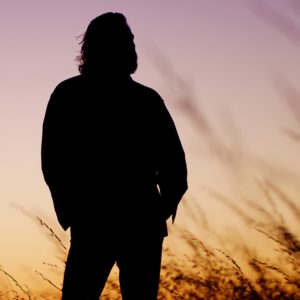 “From my point of view, I’m sure Neanderthals would have totally loved Coca-Cola Zero,” says philosopher Timothy Morton in the film. “If it’s true that Neanderthals would have become totally addicted to Angry Birds, then contemporary society is saying something true about ancient people.”
“From my point of view, I’m sure Neanderthals would have totally loved Coca-Cola Zero,” says philosopher Timothy Morton in the film. “If it’s true that Neanderthals would have become totally addicted to Angry Birds, then contemporary society is saying something true about ancient people.”
We didn’t just recently learn to crave sugar and fat, or to be fascinated by bright, shiny distractions. Those impulses were what caused us to survive and reproduce. We all chase comfort. We all want status so we can breed. The surplus food and energy produced by chemical agriculture and the modern petrochemical industry is allowing the superorganism to create experiences that are sweeter, shinier, even more distracting. Even if it eventually kills us by creating an unlivable climate and habitat, culture is only doing what we tell it to.
In order to change the trajectory of the superorganism, we need to consciously change what we want, as a species. “The head of sustainability for all the Costco stores said it was the first film where you really felt this interconnectedness,” says Kucera. “I don’t mean like in a woo-woo way; the idea of the superorganism works regardless of political party, regardless of country.”
“Imagine somebody saying it’s all your fault or somebody’s trying to shame you: you don’t feel good, you have your defenses up. This film is more like an invitation than a hammer.” —Susan Kucera
I’ll admit that this construction set off warning bells for me. I thought it was a conservative argument to do nothing. When I first watched the film, I was yelling at the screen, “But what do you want us to do?!” As an example, the film focuses a lot on the idea that we are all dependent on energy flows from the sun (Dr. Ugo Bardi, an Italian professor of physical chemistry, calls fossil fuels “fossil sunlight”); the film presents a case that, instead of dividing ourselves into two warring camps—one wanting to leave all the fossil fuels in the ground and one wanting to burn them up—we should use them wisely to power a transition to a new energy source that we can actually use to survive. I heard myself arguing that we have to leave it in the ground or this transition will never happen. Those old tribal divisions are hard to shake off.
But Kucera and Bridges are adamant that “doing” is the point of the movie. If everyone bobs along like The Dude and simply waits it out, we will all be victims of the “emergent behavior”—or culture—that is produced by the superorganism. That culture is emergent because no one can predict what it will be, nor can they steer it. One invention, like a wheel or a religion or an Endangered Species Act, changes the entire course of planetary history. Kucera and Bridges aren’t telling people their actions are futile; rather, they are saying that our individual actions are essential. Individual actions are what steer the superorganism.
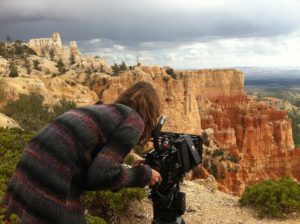
Susan Kucera BTS
“Are you familiar with Bucky Fuller?” Bridges asks me. “Buckminster Fuller made an observation about ocean-going tankers and the large rudder that was needed to turn these big ships. Turning the rudder took too much energy, so the engineers came up with a brilliant idea of putting a little tiny rudder on the big rudder.” That’s called a trim tab.
“So, the little rudder turns the big rudder and the big rudder turns the ship, and Bucky said that’s a wonderful metaphor for how the individual is connected with society and culture. We are all trim tabs, we all matter and we make a difference. The only thing on Bucky’s gravestone is ‘Call me trim tab.’ So that’s how I like to think of myself, as a trim tab. We can all work in different ways. I’m in the movies, I have a certain amount of celebrity, so I do things like I’m doing with you right now.”
—
Environmental action is in Jeff Bridges’ blood. In the late 1950s, he and his brother Beau both appeared on the TV show Sea Hunt, which starred their father, the late Lloyd Bridges. Lloyd had served in the Coast Guard and was a scuba diver who did his own stunts on the show, and he and his wife campaigned to bring awareness to the problem of marine pollution worldwide, even lobbying for a world government that could better mandate a clean-up. Lloyd was later involved with Heal the Bay and Ted Danson’s American Oceans Campaign. Jeff and Beau followed in his footsteps by serving in the Coast Guard and Coast Guard Reserve, and continuing on with the family campaign for ocean health. “I often think of myself as an extension of my folks, just carrying on their work,” Jeff Bridges tells me.
Bridges is a longtime student of Buddhism—which explains a few things about The Dude—and says that this practice informed the making of Living in the Future’s Past. All of the voices in the film are not meant to inflame one tribe against another, but rather to lead us to collective action. He trusts that this action will be the right one because he has a deep faith in the basic goodness of humanity.
“One of my dear friends and teachers recently passed away, a fellow by the name of Bernie Glassman, who was the head of an organization called Zen Peacemakers,” Bridges says. Glassman would take students on Bearing Witness Retreats, where they would live homeless on the streets, or visit Auschwitz, or go to South Dakota to be with Native Americans protesting oil pipelines. Glassman’s Zen practice had three tenets:
“The first one is: Not Knowing,” says Bridges. “We all have opinions, but just to realize that they’re opinions, man, to say, ‘I don’t know. This is what I’m feeling, but I don’t know.’
“And then to bear witness, to engage, just to put yourself in the spot. Usually it’s an uncomfortable spot, but that’s where the work needs to be done. Just feeling it, informing yourself, and getting all different points of view.
“Out of those two things, out of not knowing and bearing witness, out of that will come an action,” he adds, describing the third tenet. “I guess you can call it love; a loving action will come out of that, because we are an inherently compassionate species.”
“Personally, being Buddhistly bent, I don’t know about sustainability. I mean, everything changes, man. I don’t think you can really sustain any one thing.”
Kucera feels the loving changes coming, but she recognizes that everyone and every place is compromised. She lives in Hawaii, a state that has moved heavily into solar power. She edited the entire film there using solar electricity. Still, 80 percent of the islands’ food has to be shipped in, almost all of it using dirty fossil fuels. Hawaiians think of themselves as progressive people, and she wants to invite everyone to reconsider their role in solving climate change, rather than cast blame.
“Imagine somebody saying it’s all your fault or somebody’s trying to shame you: you don’t feel good, you have your defenses up,” she says. “This film is more like an invitation than a hammer.”
Maybe the idea of sustainability itself is something we have to give up, because it assumes things will stay the same.
“Personally, being Buddhistly bent, I don’t know about sustainability,” says Bridges. “I mean, everything changes, man. I don’t think you can really sustain any one thing.”
He feels the right goal would probably be resilience. “How do we become resilient, and how do we learn to serve what’s cooking?”
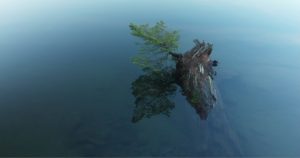 Developing resiliency doesn’t mean getting back to “normal” as fast as possible. It probably means accepting that there is no normal. Bridges acknowledges that this is not easy to do. Even after acting out loads of different lives, making eighty-some films and a bushel of TV shows, he craves comfort and returning to habit. He says he would have rebuilt the house that was taken out by the mudslide. His wife, however, wouldn’t go back. She also quit smoking after something like fifty years. He recognizes that we are capable of change.
Developing resiliency doesn’t mean getting back to “normal” as fast as possible. It probably means accepting that there is no normal. Bridges acknowledges that this is not easy to do. Even after acting out loads of different lives, making eighty-some films and a bushel of TV shows, he craves comfort and returning to habit. He says he would have rebuilt the house that was taken out by the mudslide. His wife, however, wouldn’t go back. She also quit smoking after something like fifty years. He recognizes that we are capable of change.
“This change that we’re resisting can actually be a wonderful thing,” he notes.
Hard times are ahead of us as we dig in, collectively, and change our culture. Superorganism or not, there will be winners and losers. But something extraordinary is also possible in the future that we’re creating. It’s not too late for us to rescue our fellow species from the brink of extinction, to create a livable world, to establish equality and real contact with the living earth, and to change the values that have driven us. In the last scene of the film, Bridges quotes the Jesuit philosopher Pierre Teilhard de Chardin, indicating that the best may still be ahead:
“After mastering the winds, the waves, the tides, and gravity, we shall harness for God the energies of love, and then, for a second time, man will have discovered fire.” FL
